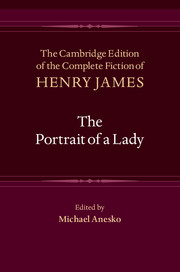Book contents
- Frontmatter
- Contents
- List of Illustrations
- Acknowledgments
- List of Abbreviations
- General Editors’ Preface
- General Chronology of James’s Life and Writings
- Introduction
- Textual Introduction
- Chronology of Composition and Production
- Bibliography
- The Portrait of a Lady
- Glossary of Foreign Words and Phrases
- Notes
- Textual Variants
- Emendations
- Appendices
Chapter 49
Published online by Cambridge University Press: 11 April 2021
- Frontmatter
- Contents
- List of Illustrations
- Acknowledgments
- List of Abbreviations
- General Editors’ Preface
- General Chronology of James’s Life and Writings
- Introduction
- Textual Introduction
- Chronology of Composition and Production
- Bibliography
- The Portrait of a Lady
- Glossary of Foreign Words and Phrases
- Notes
- Textual Variants
- Emendations
- Appendices
Summary
MADAME MERLE had not made her appearance at the Palazzo Roccanera on the evening of that Thursday of which I have narrated some of the incidents, and Isabel, though she observed her absence, was not surprised by it. Things had passed between them which added no stimulus to sociability, and to appreciate which we must glance a little backward. It has been mentioned that Madame Merle returned from Naples shortly after Lord Warburton had left Rome, and that on her first meeting with Isabel (whom, to do her justice, she came immediately to see) her first utterance was an inquiry as to the whereabouts of this nobleman, for whom she appeared to hold her dear friend accountable.
“Please don't talk of him,” said Isabel, for answer; “we have heard so much of him of late.”
Madame Merle bent her head on one side a little, protestingly, and smiled in the left corner of her mouth.
“You have heard, yes. But you must remember that I have not, in Naples. I hoped to find him here, and to be able to congratulate Pansy.”
“You may congratulate Pansy still; but not on marrying Lord Warburton.”
“How you say that! Don't you know I had set my heart on it?” Madame Merle asked, with a great deal of spirit, but still with the intonation of good-humour.
Isabel was discomposed, but she was determined to be goodhumoured too.
“You shouldn't have gone to Naples, then. You should have stayed here to watch the affair.”
“I had too much confidence in you. But do you think it is too late?”
“You had better ask Pansy,” said Isabel.
“I shall ask her what you have said to her.”
These words seemed to justify the impulse of self-defence aroused on Isabel's part by her perceiving that her visitor's attitude was a critical one. Madame Merle, as we know, had been very discreet hitherto; she had never criticised; she had been excessively afraid of intermeddling. But apparently she had only reserved herself for this occasion; for she had a dangerous quickness in her eye, and an air of irritation which even her admirable smile was not able to transmute.
- Type
- Chapter
- Information
- The Portrait of a Lady , pp. 494 - 505Publisher: Cambridge University PressPrint publication year: 2016

